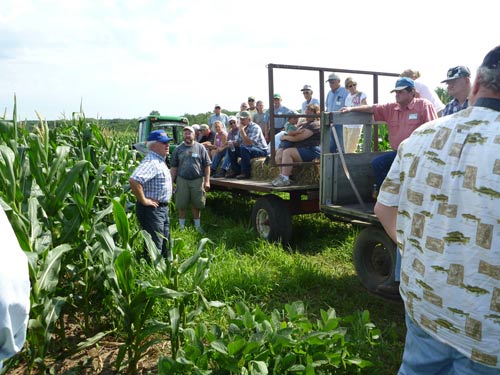TOOLS

Arland Otte, a Whitewater Watershed Farmer-Led Council member, shares water protection practices he’s using on his farm.
Best Management Practices Handbook | Minnesota Department of Agriculture This concise, regularly updated handbook features farming practices that protect water quality. Use it to learn more, choose practices, and measure results.
Source Water Protection Web Mapping Application These maps show Minnesota wells and the land draining to them. They can inform decisions on the land and help us see the connection between land management and the water we drink.
GOVERNMENT AGENCY ASSISTANCE
Soil & Water Conservation Agencies Every county in the United States has a Soil & Water Conservation District team that provides help to landowners, education and planning, and coordination of public and private conservation work. Natural Resources Conservation Service employees have a similar mission. In our watershed these groups work together closely to provide services, educational opportunities, cost-share for conservation practices, and farm conservation tours. Learn more here: Olmsted County; Winona County; Wabasha County.
Well Testing Annual testing is recommended for all people who drink from a private well. Olmsted, Winona and Wabasha Counties advise on water-related issues and offer well testing kits to residents for a small fee.
Minnesota Department of Agriculture (MDA) ensures the integrity of our food supply, the health of our environment, and the strength of our agricultural economy. Turn to MDA for guidance on farming practices, food safety and licensing, best management practices for water protection, and energy. Consider participating in this agency’s Minnesota Agriculture Water Quality Certification Program. Our watershed is one of four pilot watersheds in the state. To be certified, farmers adopt on-farm conservation practices that protect Minnesota’s lakes and rivers. In return they receive compliance certainty for 10 years, priority technical assistance, and cost share dollars for practices protecting water quality.
University of Minnesota Extension provides a wealth of information and tools to inspire and help with farm decision-making.
Nutrient & Manure Management A manure management planning spreadsheet is available here from the Minnesota Pollution Control Agency, with resources to help develop a plan and effectively apply manure and comply with Minnesota regulation.
NONGOVERNMENT ORGANIZATIONS
Whitewater River Farmer-Led Council This group meets quarterly in our watershed to work together for better water quality in local streams. A positive environmental legacy is the goal, including leaving land in better shape than when members started farming. The group decides together which practices will work in this area, implements them, and promotes them to others. To get involved call the Whitewater Watershed Project: 507-457-6445.
Midwest Cover Crops Council Two web-based tools on this group’s website help farmers choose cover crops for field and vegetable rotations. They are easy to use.
Driftless Area Restoration Effort (DARE) Many miles of streams have been improved throughout the Driftless Region by DARE and its partner, Trout Unlimited. Contact DARE for help restoring and conserving habitats for brook trout, smallmouth bass, nongame fish and snakes.
Land Stewardship Project This group fosters a stewardship ethic for farmland, promotes sustainable agriculture and is dedicated to transformational change in food and farming systems. Connect for new farmer training and resources, and learn about local organizing, policy and development of community-based food systems.
Fishers & Farmers Partnership For the Upper Mississippi River Basin This organization champions landowner leadership for better farms and fish habitat. Seed money is available for projects led locally, by landowners.
Add opportunities for action to this list! Send information to: connect@mississippi-winonawatershed.org.

